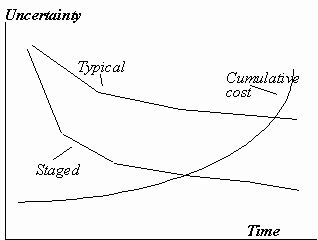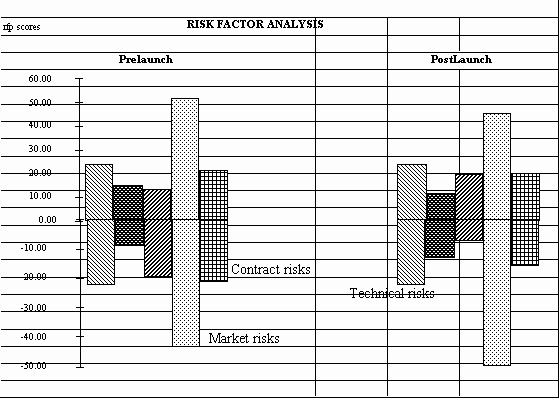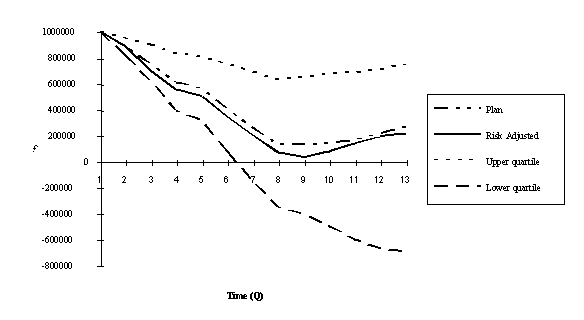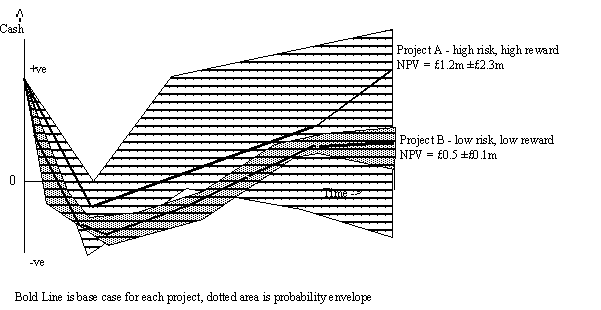Technology Commercialisation
The Problem
Many investors do not feel comfortable with technological issues: most scientists have little experience in finance and business management. Many financial advisors do not have a background in technology. The result is poor project risk assessment, high 'hurdle' rates of return on technology ventures and good ideas either not being supported or being poorly developed:
- One in seven new technology projects make it through to commercialisation;
- Only half are successful once launched;
- 45% of failed projects are related to late or inadequate market analysis;
- In the UK 75% of development money is spent on projects that fail;
- Time delays typically reduce project NPV by 50-70%.
The Solution
Z/Yen can:
- Take a technological capability, identify and quantify market opportunities, and turn it into a business plan;
- Appraise a business plan for a technology driven venture;
- Devise systematic methodologies for technology exploitation;
- Implement the business plan.
The Benefits
Z/Yen structures technology commercialisation projects to reduce uncertainty and control risk through the development. This has been called a 'staged' or 'staged checkpoints' methodology. The aim of Z/Yen's approach to technology commercialisation is a controlled development process, where uncertainty falls rapidly while costs rise slowly. The benefits of a systematic methodology based on Z/Yen's approach to risk/reward in technology exploitation can include:
- Better products and services delivered to the market;
- Increased revenues from technology exploitation;
- Reduction in the time and money spent on unsuccessful projects.

Our Techniques
We employ a mixture of numeric and qualitative techniques:
- Z/Yen used staff workshops and expert panels to identify risks in the new product development process of a leading computer games company and then applied statistical methods to quantify project uncertainties;
- For calculating the costs of capital and desired rates of return in a volatile sector of the European chemical industry Z/Yen used stochastic modelling of multivariate outcomes;
- To evaluate commercial concepts for biochemical and medical IT companies, Z/Yen used systematic qualitative analysis of risk areas, their consequences and probability;
- For project managing a new commercial service in dynamic design Z/Yen used 'staged checkpoints' methods of planning to set priorities and control risk.
Our Experience
Z/Yen staff offer a broad variety of technical business, and academic experience with qualifications in science, law, economics and accountancy who have raised significant financial backing for clients businesses. Recent projects have included technologies varying from IT to biotechnology, from engineering finite element analysis to industrial metallurgy. Z/Yen is working on civil sector applications of Ministry of Defence technology, and in particular has formed a consortium (with BZW, Royal & Sun Alliance, Silicon Graphics, The London Stock Exchange, and the Defence Evaluation and Research Agency) to apply 'virtual reality' to financial modelling and analysis.
Insights Into Technology Commercialisation
Z/Yen has a number of staff who between them have managed, appraised and launched over a hundred technology commercialisation projects, in industries ranging from pharmaceuticals, to petrochemicals, engineering, computing, networks and electronics. There are a number of generic management issues which Z/Yen sees consistently recurring in these projects. Some are 'one-off' issues, addressed at particular times in the 'staged checkpoints' process, but most are ongoing, and should form part of the project manager's checklist at every stage.
Successful Projects:
- Provide a beneficial innovation to the end-user;
- Involve very early marketing and manufacturing (where relevant) feasibility studies;
- Require a detailed market analysis to identify commercial and technical development targets;
- Have assessed whether the technology will function in a real environment when used by real customers, e.g.:
- Will the electronics be fragile if dropped or shaken?
- Will the aircraft engine survive birdstrikes?
- Will the catalyst be tolerant of feedstock impurities?
- Have worked as a project based team, with clear accountabilities;
- Are disciplined in using and acting upon external market or technical reviews;
- Have budgeted for, planned and successfully implemented launch and post-launch activities.
Z/Yen staff have also encompassed a number of what might be termed 'learning experiences'. Some of the lessons learned are highly qualitative, but real nonetheless.
Unsuccessful Projects....(real quotes!):
- “It was such nice science that we just had to take it further”
- “Oh no, I think it will sell more than that...”
- “We hadn’t realised that Japanese people are allergic to the smell of that chemical”
- “Who was in charge? well, I suppose I was really” (five different managers)
- “The external consultant told us it would never work, so we sacked him and got one who could give us the right answer”
- “We don’t need to translate the brochures, they all speak English”
Specific Project Assessment
As well as the generic lessons described above, many activities in a technology commercialisation project will be specific to that industry. How can a company or organisation identify these specific activities before launching a new product or service? Z/Yen uses a variety of workshops, brainstorming, and expert panels to identify risk areas. We then assess these risk areas using a systematic qualitative methodology, which generates actions and insights at each phase.
| Risk Area | Assessment | Impact | Mitigation | Severity | Likelihood |
|---|---|---|---|---|---|
| Sub-Technology X | 7.6 | 3.4 | 5.3 | 7.5 | 4.0 |
| Customer Sector Y | 8.2 | 2.4 | 2.7 | 4.9 | 6.1 |
The risk assessment methodology allows Z/Yen and its clients to generate specific action plans (typically up to 80 points in each phase of the 'staged checkpoints' process), and allows simple statistical analysis to be carried out. Each project can be graphically represented to illustrate areas of weakness in the project (bar extending below base line), and areas of high uncertainty (very long bar). A simple example from a high risk I.T. industry might be:

Financial Analysis Of Technology Commercialisation Projects
The risk factor analysis described above generates questions which drive better project forecasting. Instead of running somewhat arbitrary sensitivity analyses, the risk factors can be quantified as probability curves in the project cash flow forecast:

This enables projects to be compared in the context of an overall portfolio of risk:

Z/Yen welcomes opportunities to work with clients in one of the most rewarding fields of all, seeing new technology make a difference.
Technology Commercialisation - Publications
- Why Employee Share Ownership Matters
- The Future Of UK Fraud - Challenging High-Volume, Automated Crime
- Edgy – Central Bank Digital Currencies Could Cut A Number Of Ways
- The Elusion Of Efficiency (During Covid-19)
- Trade Doesn't Need Trade Deals: But Financial Services Do
- Blockchain Could Help Us Reclaim Control Of Our Personal Data
- Which Way For Blockchain Standards In 2017?
- The Missing Links In The Chains? Mutual Distributed Ledger (aka Blockchain) Standards
- What Is And What Isn't A 'Blockchain'? Terminology Wars: I Record Therefore I Ledger; I Block Therefore I Chain?
- Cracking The VW Case With NOx Bonds
- Unblock The Shared Economy: Mutual Distributed Ledgers
- How Much? Confidence Accounting
- What Has Accounting Got To Do With The Price Of Fish
- Measuring The Value Of Online Communities
- Ethical Assessment Of New Technologies: A Meta-Methodology
- Size Matters: Risk & Scale
- Caveat Emptor, Caveat Venditor: Buyers & Sellers Beware The Tender Trap (procurement)
- Measured Governance Returns: Is There Bad Corporate Governance?
- How Can You Have Too Much Choice?
- Competitive Compliance: Manage & Automate, Or Die